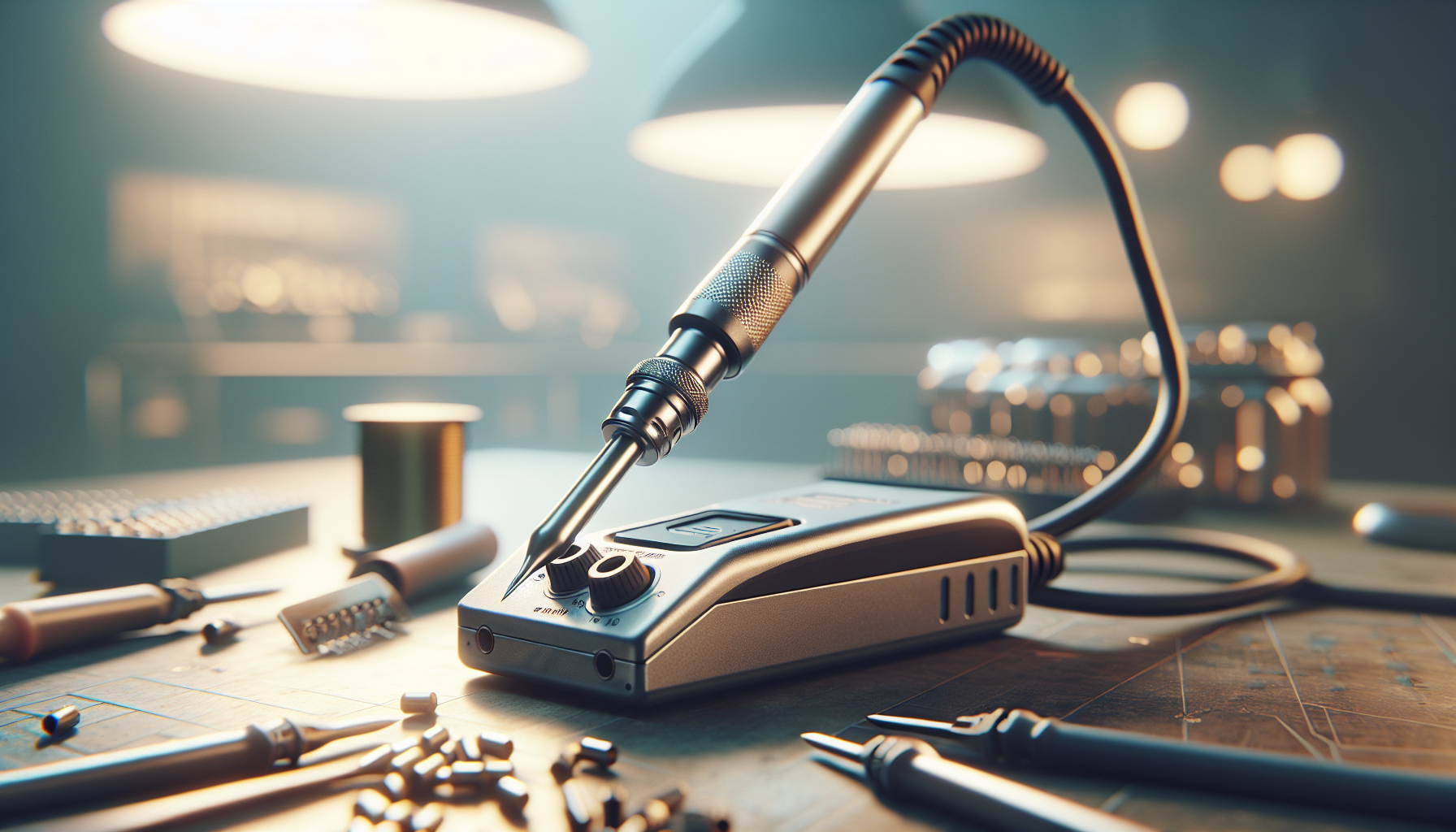Who File ISF For Electric Soldering Irons
Have you ever wondered about the intricacies behind the import process for electric soldering irons? Understanding who files the Importer Security Filing (ISF) for electric soldering irons is crucial if you’re involved in the import business or even considering starting one. This aspect of international trade might seem daunting, but with the right information, it can become much clearer.

Overview of Importer Security Filing (ISF)
The Importer Security Filing (ISF) is a set of documents required by U.S. Customs and Border Protection (CBP) to enhance security guidelines and mitigate risks associated with smuggling and terrorism. This filing is particularly important for items like electric soldering irons, as understanding the parties responsible for these filings can help you streamline your import processes.
What Does ISF Mean for Electric Soldering Irons?
The ISF, specifically regarding electric soldering irons, involves various stakeholders in the import process. As an importer, you hold certain responsibilities that impact the smooth movement of goods. Ensuring that the ISF is filed correctly can prevent delays and enhance compliance with U.S. regulations.
Who is Responsible for Filing ISF for Electric Soldering Irons?
The responsibility for filing the ISF for electric soldering irons typically falls on the importer of record (IOR). This individual or entity takes full responsibility for ensuring that all necessary documentation is compliant and submitted in a timely fashion. If you are importing these goods, it’s essential to understand your role.
However, many importers choose to work with freight forwarders or customs brokers who file the ISF on their behalf. It’s essential to maintain clear communication and ensure that your chosen partner understands the specific requirements for electric soldering irons and other similar items.
The Importance of Accurate ISF Filing
Failing to file an accurate ISF can lead to significant consequences, including customs delays and financial penalties. Given the technical nature of electric soldering irons, the specifications, manufacturing, and shipping details must be accurately conveyed in the ISF to avoid complications.
Key Components of ISF Filing
When preparing to file the ISF for electric soldering irons, certain crucial components need to be included:
- Importer Information: Essential details about your business, including your IRS number.
- Consignee Details: Information about the person or entity receiving the goods.
- Manufacturer Data: The name and address of the manufacturer or supplier of the electric soldering irons.
- Country of Origin: The location where the goods are manufactured.
- Harmonized Tariff Code: A classification code that provides information about tariff rates and regulations. It’s vital for electric soldering irons to ensure the correct tariffs are applied.
Accurate filing of these details ensures compliance and helps protect your shipment from delays at customs.
Filing Timeline for Electric Soldering Irons
Being aware of the timeline for filing the ISF for electric soldering irons is crucial. The ISF must generally be filed at least 24 hours before the goods are loaded onto a vessel at the foreign port. This leads to ensuring that Customs has ample time to review the provided information.
Steps to Prepare for ISF Filing
-
Gather Documentation: Ensure that all necessary evidence and documentation are at hand. This includes invoices, shipping details, and supplier information.
-
Choose Your Filing Method: You can either file it yourself or hire a professional. If you opt for a customs broker or freight forwarder, ensure they are well-versed in the requirements for electric soldering irons.
-
Double-Check Information: Before submitting, verify all information to reduce the chances of errors, which could lead to complications.
-
Submit the ISF: Make sure to submit your ISF within the required timeline to avoid penalties.
How to File ISF for Electric Soldering Irons
Now that you know the components and timeline, let’s discuss how to file the ISF for electric soldering irons. This process can vary slightly depending on whether you’re doing it independently or through a third party.
Using a Customs Broker or Freight Forwarder
If you decide to work with a customs broker or freight forwarder, the process becomes easier. You would need to provide them with all required documentation, and they will handle the filing on your behalf. Here are the steps involved:
-
Select a Reputable Broker: Look for a customs broker experienced in handling ISFs for electric soldering irons.
-
Provide Necessary Information: Share all relevant information and documentation with your selected broker.
-
Review the Filing: It’s always a good idea to review the ISF before submission.
-
Confirm Submission: Once filed, ensure you receive confirmation of submission.
Filing Independently
If you opt to file the ISF yourself, you’ll need to:
-
Access CBP Portal: Register for access to the U.S. Customs and Border Protection (CBP) portal.
-
Complete the ISF Form: Fill in all relevant details carefully, ensuring accuracy.
-
Submit the Filing: File it electronically through the portal.
-
Obtain Confirmation: Make sure to save the confirmation of submission.

The Risks of Inaccurate ISF Filing
When it comes to electric soldering irons, even a small error in the ISF can have significant repercussions. Here are some common risks you may face:
- Delays in Shipment: Customs holds can lead to extended delays, disrupting your supply chain.
- Fines and Penalties: Inaccuracies in filing can attract hefty fines, impacting your bottom line.
- Increased Scrutiny: Inconsistent filings may increase the chances of your goods being subject to additional inspections by customs.
By diligently managing your ISF filing for electric soldering irons, you can mitigate these risks effectively.
Common Mistakes to Avoid
To navigate the ISF process smoothly, be aware of common mistakes:
- Lack of Manufacturer Information: Providing incomplete information about manufacturers can lead to issues.
- Incorrect Harmonized Codes: Ensure the tariff codes you’re using are correct for electric soldering irons to avoid complications.
- Missing Deadlines: Remember to file the ISF in advance of the shipping date to avoid delays.
Call to Action: ISF 10+2 Filing
Are you looking for assistance with your ISF 10+2 filing? Our team can help ensure that your submission is accurate and compliant, avoiding unnecessary delays and fines. Reach out today to learn more about our services for electric soldering irons.
The Role of Compliance in the ISF Process
Ensuring compliance is not just about avoiding penalties; it’s also about maintaining your business’s reputation. Disregarding the ISF filing requirements can have long-term repercussions on your business relationships and your standing in the industry.
Staying Updated with Regulations
Regulations surrounding ISF filings can change, so it’s essential to stay informed. Keep abreast of changes by regularly checking updates from CBP and following industry news specific to electric soldering irons and your sector.
Call to Action: Entry Filing
Need help with entry filing for your shipments? Our experienced professionals are here to assist you with smooth processing of your electric soldering irons and ensure compliance with all regulations. Contact us for support with your entry filing needs.
Navigating Customs Bonds
Understanding customs bonds is crucial in the import process. A customs bond ensures that you’re adhering to customs regulations and are financially responsible for any duties owed on your shipment.
Types of Customs Bonds
There are several types of customs bonds, including:
- Single Transaction Bonds: These are used for specific shipments, ensuring compliance for that particular entry.
- Continuous Bonds: Ideal for businesses that import frequently, these bonds cover multiple shipments over time.
When importing electric soldering irons, choosing the appropriate bond can save you time and reduce headaches with customs compliance.
Call to Action: U.S. Customs Bond
Are you in need of a customs bond for your shipments? Let us help you secure the right bond for your electric soldering irons. Our experienced team can guide you through the process and ensure you meet all regulatory requirements. Get in touch with us today!
Final Thoughts on ISF for Electric Soldering Irons
Navigating the ISF filing for electric soldering irons may seem complex, but it’s manageable with the right knowledge and resources. Your role as an importer is critical in ensuring that this process is executed smoothly.
By keeping lines of communication open with your customs broker or freight forwarder, staying informed about regulatory changes, and accurately filing your ISF, you can prevent delays and save money. Remember, the goal is to ensure compliance while reducing risks associated with your shipments.
Call for free ISF or entry filing consultation. Your success as an importer depends on it!

